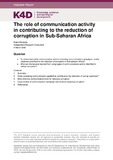| dc.contributor.author | Richards, Robin | |
| dc.coverage.spatial | South Africa | en |
| dc.coverage.spatial | Nigeria | en |
| dc.coverage.spatial | Papua New Guinea | en |
| dc.coverage.spatial | Zimbabwe | en |
| dc.coverage.spatial | Zambia | en |
| dc.coverage.spatial | Uganda | en |
| dc.date.accessioned | 2020-03-20T11:04:17Z | |
| dc.date.available | 2020-03-20T11:04:17Z | |
| dc.date.issued | 2020-03-06 | |
| dc.identifier.citation | Richards, R. (2020). The role of Communication Activity in Contributing to the Reduction of Corruption in Sub-saharan Africa. K4D Helpdesk Report. Brighton, UK: Institute of Development Studies. | en |
| dc.identifier.uri | https://opendocs.ids.ac.uk/opendocs/handle/20.500.12413/15177 | |
| dc.description.abstract | This rapid literature review concentrates on the role of communications activity (including communications campaigns and media relations in contributing to the reduction of corruption in Sub-Saharan Africa. The review also determines if there are any evidence-based examples on the impact of communications (campaigns or related activities) on reducing corruption. Subsidiary questions in the review are to determine if the there are any lessons learned from using specific types of communication activity; the types of corrupt practices that communications activity can help to reduce and, if there are any effective communication tools for reducing corruption. Findings of the review show that there is evidence that communication campaigns have an impact on corruption through reducing bribery and promoting reporting of corruption. However, further research is needed to confirm the sustainability of the impact of such campaigns and interventions. The review also suggests that many of the communication interventions that address corruption are initiated by civil society and some of these are undertaken in collaboration with governments. The literature was mostly from grey and donor sources. In addition, published papers and reports were used from international development organisations and to a lesser extent academic literature (including books and journal articles). There is a dearth of literature on the impact of communications interventions on corruption and the types of communications that are most effective. There is also little literature or evidence on whether increasing the communication capabilities of government communications units or ministries has an impact on reducing corruption. In addition, the linkages between the types of interventions to fight corruption and which types of interventions have the biggest impact on particular types of corruption is sparse. | en |
| dc.language.iso | en | en |
| dc.publisher | IDS | en |
| dc.relation.ispartofseries | K4D Helpdesk Report;768 | |
| dc.rights.uri | https://www.nationalarchives.gov.uk/doc/open-government-licence/version/3/ | en |
| dc.subject | Governance | en |
| dc.subject | Participation | en |
| dc.subject | Politics and Power | en |
| dc.title | The Role of Communication Activity in Contributing to the Reduction of Corruption in Sub-Saharan Africa | en |
| dc.type | Helpdesk | en |
| dc.rights.holder | © DFID - Crown copyright 2020 | |
| dcterms.dateAccepted | 2020-03-06 | |
| rioxxterms.funder | Department for International Development, UK Government | en |
| rioxxterms.identifier.project | K4D | en |
| rioxxterms.version | VoR | en |
| rioxxterms.funder.project | 238a9fa4-fe4a-4380-996b-995f33607ba0 | en |

